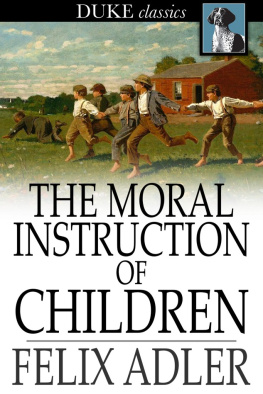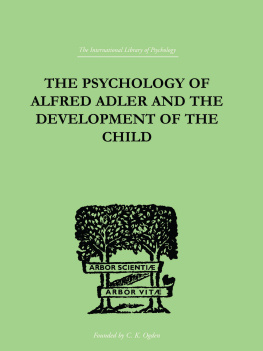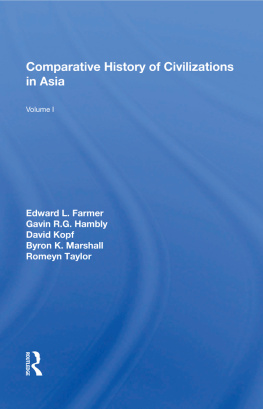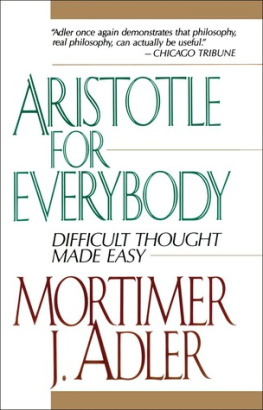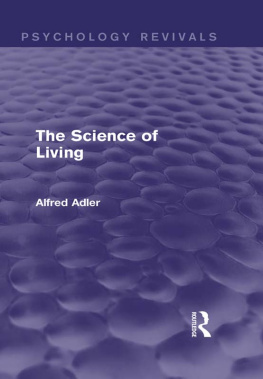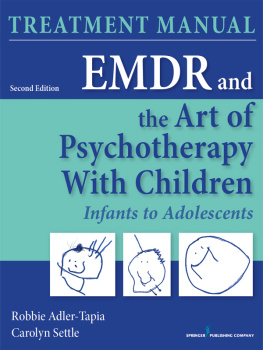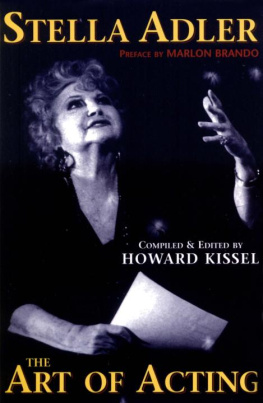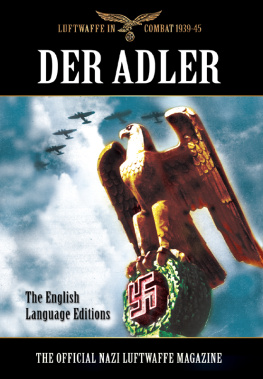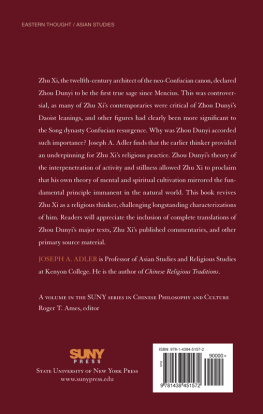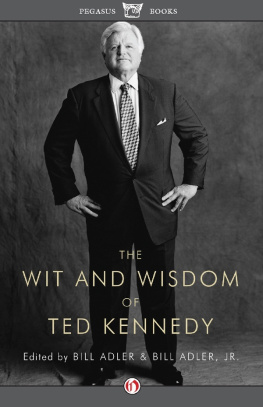THE MORAL INSTRUCTION OF CHILDREN
* * *
FELIX ADLER
*
The Moral Instruction of Children
First published in 1892
ISBN 978-1-62013-721-5
Duke Classics
2014 Duke Classics and its licensors. All rights reserved.
While every effort has been used to ensure the accuracy and reliability of the information contained in this edition, Duke Classics does not assume liability or responsibility for any errors or omissions in this book. Duke Classics does not accept responsibility for loss suffered as a result of reliance upon the accuracy or currency of information contained in this book.
Contents
*
Editor's Preface
*
Moral education is everywhere acknowledged to be the most important partof all education; but there has not been the same agreement in regard tothe best means of securing it in the school. This has been due in partto a want of insight into the twofold nature of this sort of education;for instruction in morals includes two things: the formation of rightideas and the formation of right habits. Right ideas are necessary toguide the will, but right habits are the product of the will itself.
It is possible to have right ideas to some extent without thecorresponding moral habits. On this account the formation of correcthabits has been esteemed by some to be the chief thing. But unconscioushabitsmere use and wontdo not seem to deserve the title of moral inits highest sense. The moral act should be a considerate one, and reston the adoption of principles to guide one's actions.
To those who lay stress on the practical side and demand the formationof correct habits, the school as it is seems to be a great ethicalinstrumentality. To those who see in theoretical instruction the onlytrue basis of moral character, the existing school methods seem sadlydeficient.
The school as it is looks first after its discipline, and next after itsinstruction. Discipline concerns the behavior, and instruction concernsthe intellectual progress of the pupil. That part of moral educationwhich relates to habits of good behavior is much better provided for inthe school than any part of intellectual education.
There is, however, a conflict here between old and new ideals. Theold-fashioned school regarded obedience to authority the one essential;the new ideal regards insight into the reasonableness of moral commandsthe chief end. It is said, with truth, that a habit of unreasoningobedience does not fit one for the exigencies of modern life, with itspartisan appeals to the individual and its perpetual display of groundsand reasons, specious and otherwise, in the newspapers. The unreasoningobedience to a moral guide in school may become in after lifeunreasoning obedience to a demagogue or to a leader in crime.
It is not obedience to external authority that we need so much asenlightened moral sense, and yet there remains and will remain much goodin the old-fashioned habit of implicit obedience.
The new education aims at building up self-control and individualinsight. It substitutes the internal authority of conscience for theexternal authority of the master. It claims by this to educate thecitizen fitted for the exercise of suffrage in a free government. Hewill weigh political and social questions in his mind, and decide forhimself. He will be apt to reject the scheme of the demagogue. While theold-fashioned school-master relied on the rod to sustain his externalauthority, he produced, it is said, a reaction against all authority inthe minds of strong-willed pupils. The new education saves thestrong-willed pupil from this tension against constituted authority, andmakes him law-abiding from the beginning.
It will be admitted that the school under both its formsold as well asnewsecures in the main the formation of the cardinal moral habits. Itis obliged to insist on regularity, punctuality, silence, and industryas indispensable for the performance of its school tasks. A privatetutor may permit his charge to neglect all these things, and yet securesome progress in studies carried on by fits and starts, with noise andzeal to-day, followed by indolence to-morrow. But a school, on accountof its numbers, must insist on the semi-mechanical virtues ofregularity, punctuality, silence, and industry. Although these aresemi-mechanical in their nature, for with much practice they becomeunconscious habits, yet they furnish the very ground-work of allcombinations of man with his fellow-men. They are fundamental conditionsof social life. The increase of city population, consequent on thegrowth of productive industry and the substitution of machines for handlabor, renders necessary the universal prevalence of these cardinalvirtues of the school.
Even the management of machines requires that sort of alertness whichcomes from regularity and punctuality. The travel on the railroad, themanagement of steam-engines, the necessities of concerted action,require punctuality and rhythmic action.
The school habit of silence means considerate regard for the rights offellow-workmen. They must not be interfered with; their attention mustnot be distracted from their several tasks. A rational self-restraintgrows out of this school habitrational, because it rests onconsiderateness for the work of others. This is a great lesson inco-operation. Morals in their essence deal with the relation of man tohis fellow-men, and rest on a considerateness for the rights of others."Do unto others," etc., sums up the moral code.
Industry, likewise, takes a high rank as a citizen's virtue. By it manlearns to re-enforce the moments by the hours, and the days by theyears. He learns how the puny individual can conquer great obstacles.The school demands of the youth a difficult kind of industry. He mustthink and remember, giving close and unremitting attention to subjectsstrange and far off from his daily life. He must do this in order todiscover eventually that these strange and far-off matters are connectedin a close manner to his own history and destiny.
There is another phase of the pupil's industry that has an importantbearing on morals. All his intellectual work in the class has to do withcritical accuracy, and respect for the truth. Loose statements andcareless logical inference meet with severe reproof.
Finally, there is an enforced politeness and courtesy toward teachersand fellow-pupilsat least to the extent of preventing quarrels. Thisis directly tributary to the highest of virtues, namely, kindness andgenerosity.
All these moral phases mentioned have to do with the side of schooldiscipline rather than instruction, and they do not necessarily have anybearing on the theory of morals or on ethical philosophy, except in thefact that they make a very strong impression on the mind of the youth,and cause him to feel that he is a member of a moral order. He learnsthat moral demands are far more stern than the demands of the body forfood or drink or repose. The school thus does much to change the pupilfrom a natural being to a spiritual being. Physical nature becomessubordinated to the interests of human nature.
Notwithstanding the fact that the school is so efficient as a means oftraining in moral habits, it is as yet only a small influence in therealm of moral theory. Even our colleges and universities, it must beconfessed, do little in this respect, although there has been of late aneffort to increase in the programmes the amount of time devoted toethical study. The cause of this is the divorce of moral theory fromtheology. All was easy so long as ethics was directly associated withthe prevailing religious confession. The separation of Church andState, slowly progressing everywhere since the middle ages, has atlength touched the question of education.

